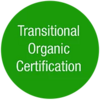
Transitional Organic Certification
About (Transitional Organic Certification)
Transitional Organic Certification refers to a certification program that recognizes the efforts of farmers who are transitioning their agricultural operations from conventional to organic practices. It provides a pathway and recognition for farmers during the conversion period, which typically takes three years, as they work towards achieving full organic certification.
During the transitional period, farmers follow organic farming practices but are not yet eligible for full organic certification or able to label their products as organic. Transitional Organic Certification provides a way to communicate to consumers and stakeholders that the farmer is in the process of transitioning to organic and is adhering to the required standards.
Here are some key points about Transitional Organic Certification:
Certification Process: The certification process for transitional organic involves an assessment of the farm's practices, inputs, and management systems by a third-party certifying body. The certifier ensures that the farmer meets the requirements and guidelines for transitional organic certification.
Compliance with Organic Standards: Transitional Organic Certification requires adherence to organic farming practices, which include avoiding the use of synthetic pesticides, fertilizers, and genetically modified organisms (GMOs). Farmers are also expected to manage soil health, biodiversity, and natural resources in an environmentally sustainable manner.
Record Keeping and Documentation: Farmers seeking transitional organic certification must maintain detailed records of their farming practices, inputs used, and any other relevant information. This documentation helps verify compliance with organic standards and provides a transparent record of the transition process.
Labeling and Marketing: Transitional Organic Certification allows farmers to communicate their commitment to organic practices to consumers and stakeholders. While they cannot use the term "organic" on product labels, they can use specific marketing language and logos related to transitional organic certification.
Transition Period: The transitional period typically lasts for three years, during which farmers progressively adopt organic practices and make necessary changes to their farming systems. The specific duration may vary depending on regional regulations and certification bodies.
Transitional Organic Certification provides recognition and support for farmers during the crucial period of transitioning from conventional to organic agriculture. It allows them to communicate their commitment to sustainable practices and helps create awareness among consumers about the importance of supporting farms in transition. Ultimately, the certification program promotes the growth of the organic industry by encouraging more farmers to adopt organic farming methods.